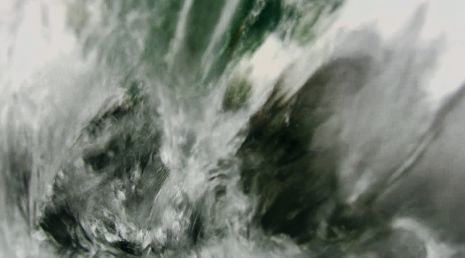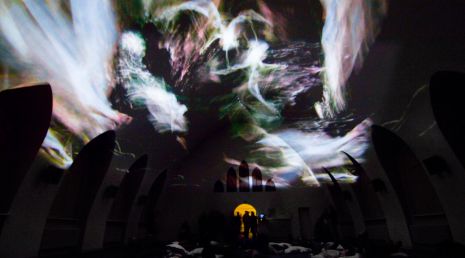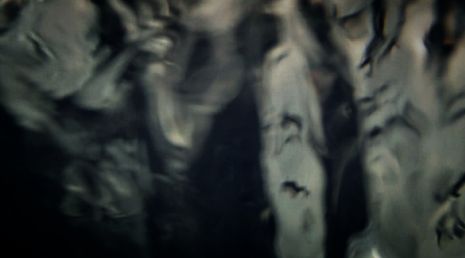Half-Knowledge
Véréna Paravel in conversation with John Oursler
“…Negative Capability, that is, when a man is capable of being in uncertainties, mysteries, doubts, without any irritable reaching after fact and reason - Coleridge, for instance, would let go by a fine isolated verisimilitude caught from the Penetralium of mystery, from being incapable of remaining content with half-knowledge.”
John Keats, in a letter to his brothers
Artist/filmmaker Castaing-Taylor is also professor of Visual Arts and Anthropology at Harvard, director of the Sensory Ethnography Lab (SEL); co-director of Graduate Studies, Critical Media Practice; and director of the Film Study Center.
SEL was established by Castaing-Taylor in 2006 as a collaboration between the departments of anthropology and visual and environmental studies. Students, visiting filmmakers, video and sound artists, photographers, and resident faculty work together with audio-visual media, as he puts it, “at an angle to dominant tendencies in both art, anthropology, and documentary film.”
Click here: a New York Times article on SEL by Dennis Lim
He and Véréna Paravel recently set up a sister Sensory Ethnography Lab at the École des Arts Politiques in Paris. The two of them have recently collaborated on four moving and still image works: Leviathan (2012); Spirits Still (2013); The Last Judgment (2013); and He Maketh a Path to Shine After Him, One Would Think the Deep to be Hoary (2013). They are currently exploring ways to establish other Sensory Ethnography Lab satellites in China, India, Abu Dhabi, and Switzerland, with the hope that this will encourage local experimental traditions with the enrichment of a global interchange between the artists, their cultures, and their works.
Collaboration is at the core of the SEL experience. In addition to his artistic partner Véréna Paravel, Ernst Karel, Stephanie Spray, J.P. Sniadecki, Diana Allan, and Aryo Danusiri number among his colleagues.
“To have artists as colleagues and collaborators, and to see how conceptually and perceptually freeing it was not to be forever hung up on rendering the whole magnitude of existence and all the vicissitudes of experience as so many iterations of linguified ‘meaning,’ was a huge revelation to me.”
LCT in conversation with Scott MacDonald
Paravel and Castaing-Taylor www.arretetoncinema.org
VP: “Every film is like an encounter…we don't have any dogma, we don’t have any approach -- nothing except our body and our willingness to do something.”
LCT: “We're interested in revealing the world in a way without expectations, and that defies expectations, including our own.”
LCT and Véréna Paravel in conversation with Eric Kohn, Indiewire
“…human meaning does not emerge only from language; it engages with the ways in which our sensory experience is pre- or non-linguistic, and part of our bodily being in the world. It takes advantage of the fact that our cognitive awareness – conscious as well as unconscious – consists of multiple strands of signification, woven of shifting fragments of imagery, sensation, and malleable memory. Works of sensory media are capable of echoing or reflecting or embodying these kinds of multiple simultaneous strands of signification. Experiencing them constitutes an intellectual challenge for the viewer, who must actively bring their critical faculties to bear on the experience of the work, in effect to complete the work through their experience of it.”
“If something were scripted, ‘to what extent can the accidental and the contingent or the uncontrolled enter the frame?’ questions Castaing-Taylor. ‘That, to us, is the one quality of documentary that can distinguish itself from fiction. We have the 'maximization of the uncontrolled' that can overpower the scripted or the directed. We never aim for simulacrum.’ "
John Oursler: When I saw the film for the first time I immediately felt that, to some degree, it was directed by nature -- that there was an arbitrariness about it that I wasn't accustomed to seeing even in a non-narrative film. Every image is controlled somehow and yet here it seemed like there was a third, non-sentient director. How much did you anticipate about the outcome before you saw a single frame?
VP: Almost nothing.”
Véréna Paravel interviewed by John Oursler
Scott MacDonald: “…Your interest in filmmaking seems experiential in the sense that John Dewey talks about artworks being concentrations/intensifications of lived experiences, rather than informational presentations and/or theoretical conjectures; and your sense of “ethnographic film” seems much broader than what that term traditionally is taken to mean.”
LCT: “…Juxtaposing perspectives from the sciences, the arts, and the humanities, the aim of the Sensory Ethnography Lab is to support innovative combinations of aesthetics and ethnography, especially with work conducted through audiovisual media (video, sound, film, photography, and “new” hypermedia), that are at an angle to dominant conventions in anthropology, documentary, and art practice.”
LCT in conversation with Scott MacDonald
Anya Jaremko-Greenwold: Do you think your film is difficult for some people to watch? There’s a lot of audience members who wouldn’t know what to think after or while watching it.
VP: Well if they feel, that’s good. If they don’t know what to think, that’s good.
LCT: Some people are not bothered by that, and others are. But there’s this desire to experience a representation or a documentary and come away feeling educated or enlightened or enriched. Or that they’ve found answers. We’re interested in those harder to pose questions, problems which don’t have an easy resolution—or the resolutions are not easily reducible or transformed into public policy.
LCT and VP in conversation with Anya Jaremko-Greenwold
“The comprehension which theory essays will be arrived at by a detour; by going back to experience of the common or mill run of things to discover the aesthetic quality such experience possesses.”
John Dewey, Art as Experience
LCT: “…Like [John] Dewey, the SEL is concerned, not to analyze, but to actively produce aesthetic experience, and of kinds that reflect and draw on but do not necessarily clarify or leave one with the illusion of “understanding” everyday experience, and it also seeks to transcend what is often considered the particular province of the human, and delve into nature…”
“…the works emerging from the SEL are more concerned with issues of aesthetics and form than documentary usually is, and are for the most part opposed to conventional documentary on a slew of counts: to the journalistic use of interviews, or of featuring subjects merely talking about their lives, ex post facto, rather than actually living them; to the reductive range of dramaturgical narrative structures documentary typically deploys, their linearity and predilection for resolution and closure; and to the narrow repertoire of styles that are sanctioned by the gatekeepers of documentary practice—in particular the ongoing hegemony half a century after the fact of a kind of lazy and lax cinéma vérité, and the consecration of a frequently unseeing and unsensing, putatively “observational,” aesthetic within the ethnographic film world, and its dismissal of anything experimental, structurally rigorous, or stylistically demanding as provincially “avant-garde” or unduly self-reflexive or self-indulgent. It is as if the custodians of the sacred flame of ethnographic cinema are oblivious to any developments in art or in film since Jean Rouch’s experiments in ethno-fiction in the 1960s and 1970s.”
LCT in conversation with Scott MacDonald
Scott MacDonald: “…Am I correct that you have jettisoned the distinction between “documentary” and “avant-garde”?
LCT: Yes. Not deliberately, I don’t think, or in some kind of dogmatic way. But just because the distinction seems indefensible, and it would never occur to me to invoke it. It’s also unfortunate: documentarians as a result often don’t see any reason to engage with so-called “experimental” or “avant-garde” traditions, and on the flip side, a category like “experimental” implicitly sets itself off against a domain that is thereby defined as non-experimental, as if documentarians just follow the rules and regulations of a genre by rote. But all genres have their conventions, are in a constant state of flux and de- and re-formation.”
LCT in conversation with Scott MacDonald
LCT, Alpert Award application




